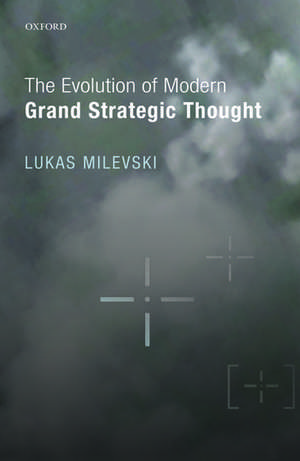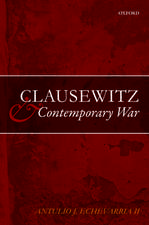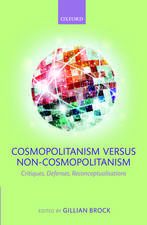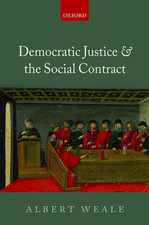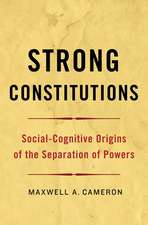The Evolution of Modern Grand Strategic Thought
Autor Lukas Milevskien Limba Engleză Hardback – 19 mai 2016
Preț: 526.42 lei
Preț vechi: 713.36 lei
-26% Nou
Puncte Express: 790
Preț estimativ în valută:
100.74€ • 104.79$ • 83.17£
100.74€ • 104.79$ • 83.17£
Carte tipărită la comandă
Livrare economică 01-07 aprilie
Preluare comenzi: 021 569.72.76
Specificații
ISBN-13: 9780198779773
ISBN-10: 0198779771
Pagini: 186
Dimensiuni: 169 x 236 x 18 mm
Greutate: 0.42 kg
Editura: OUP OXFORD
Colecția OUP Oxford
Locul publicării:Oxford, United Kingdom
ISBN-10: 0198779771
Pagini: 186
Dimensiuni: 169 x 236 x 18 mm
Greutate: 0.42 kg
Editura: OUP OXFORD
Colecția OUP Oxford
Locul publicării:Oxford, United Kingdom
Recenzii
Relatively short, although clearly argued and consistently interesting.
This book is a wonderful and concise treatise that in some ways will remind readers of Edward Mead Earle's original Makers of Modern Strategy which was published at the end of World War II. The author captures the varied insights among the giants (Mahan, Corbett, Edward M. Earle, Kahn, and Brodie) that have enriched our understanding of the apex of strategy. The book's core achievement is how it captures the subtle shifts in scholars' thinking about grand strategy in a very succinct format. With little doubt, this book will take a distinctive place in the strategic studies field.
The Evolution of Modern Grand Strategic Thought is a highly original work that offers numerous insights. It makes an important, unique contribution to the field of strategic studies and should be widely read. The book offers significant insights for strategists, policymakers, academics and those deeply concerned with understanding the subtle art of grand strategy and its further development.
This is an accomplished contribution to the literature on the history of strategic theory, precisely because it illuminates how policy debates and changing geopolitical circumstances have altered the meaning of a concept.
In addition to providing its intellectual history, Milevski offers a clear, compelling critique of grand strategic thinking...an extremely timely, efficient work on grand strategy that I believe will greatly improve the quality of debate aboutand appreciation forthe subject.
This book is a wonderful and concise treatise that in some ways will remind readers of Edward Mead Earle's original Makers of Modern Strategy which was published at the end of World War II. The author captures the varied insights among the giants (Mahan, Corbett, Edward M. Earle, Kahn, and Brodie) that have enriched our understanding of the apex of strategy. The book's core achievement is how it captures the subtle shifts in scholars' thinking about grand strategy in a very succinct format. With little doubt, this book will take a distinctive place in the strategic studies field.
The Evolution of Modern Grand Strategic Thought is a highly original work that offers numerous insights. It makes an important, unique contribution to the field of strategic studies and should be widely read. The book offers significant insights for strategists, policymakers, academics and those deeply concerned with understanding the subtle art of grand strategy and its further development.
This is an accomplished contribution to the literature on the history of strategic theory, precisely because it illuminates how policy debates and changing geopolitical circumstances have altered the meaning of a concept.
In addition to providing its intellectual history, Milevski offers a clear, compelling critique of grand strategic thinking...an extremely timely, efficient work on grand strategy that I believe will greatly improve the quality of debate aboutand appreciation forthe subject.
Notă biografică
Lukas Milevski is a Research Fellow at the University of Oxford's Changing Character of War Programme, and is a Smith Richardson Strategy and Policy Fellow. He received his PhD from the University of Reading in 2014, and he is the author of numerous articles the on historical and contemporary practice and theory of strategy. He received the 2010 RUSI Trench Gascoigne Essay Competition first prize as one of the youngest winners in its history.
